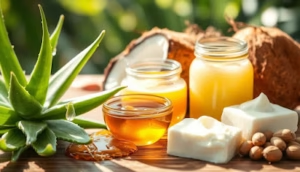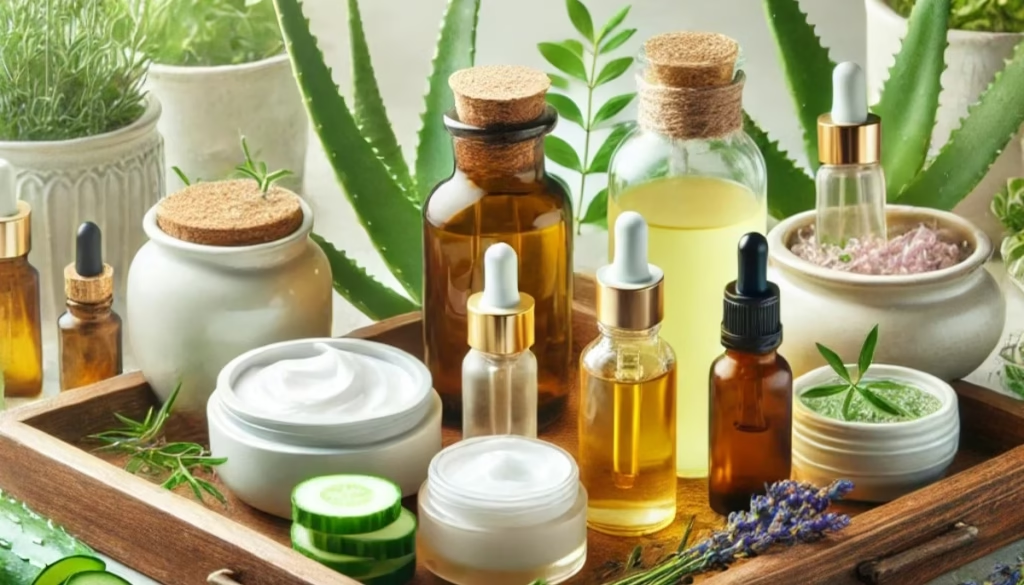What Really Works for Dry Skin? Natural Remedies You Need to Try
According to a quote from Dr. Andrew Weil, “Self-care is not selfish.” This is particularly true for the prevalent problem of dry skin. Dry skin can be managed with the use of appropriate natural remedies. We’ll go over the top natural treatments, such as essential oils and herbal medicines, to help you achieve the desired glow.
Introduction to Natural Dry Skin Remedies
Although managing dry skin can be challenging, the appropriate strategy can be beneficial. Your skin can become moisturized and healthy with natural treatments. To help you take care of your skin, we’ll examine the top treatments and solutions.
Key Takeaways
- Natural dry skin treatments can provide effective relief from dryness and discomfort
- Essential oils, kitchen ingredients, and herbal remedies are popular dry skin solutions
- Finding the best natural remedy for dry skin is crucial for maintaining healthy and hydrated skin
- Incorporating natural dry skin treatments into your skincare routine can help achieve a radiant glow
- Dry skin can be managed with the right approach and natural remedies
- Natural dry skin treatments are a great alternative to harsh chemical-based products
Understanding Dry Skin and Its Impact on Your Health
Dry skin affects more than just appearance. It can indicate a more serious health issue. Finding effective treatments for dry skin is essential to maintaining excellent health. Natural remedies can reduce inflammation and provide relief.
Tightness, flakiness, and itching are typical symptoms of dry skin. It is essential to comprehend the causes in order to identify the appropriate therapies. These may be medical or environmental. Effective natural care results from addressing the root problem.
Check out our guide on Homemade Remedy For Glowing Skin in Summer
Signs and symptoms of dry skin
- Itchiness and irritation
- Flakiness and dry patches
- Tightness and discomfort
Common causes of skin dryness
Causes include cold weather, harsh soaps, and medical conditions. Knowing the causes helps prevent dry skin. Natural care offers long-term relief and keeps skin hydrated.
The Science Behind Natural Moisturizing Factors
Using natural moisturizers is essential to maintaining hydrated and healthy skin. Ceramides and hyaluronic acid are examples of natural substances that are essential. They make dry skin appear smoother by hydrating and soothing it.
Selecting the appropriate treatment for dry skin is crucial. Seek out mild yet efficient moisturizing solutions. Long-lasting hydration and sustenance are provided by ingredients like shea butter and coconut oil.
- Hydrates and soothes dry skin
- Reduces the appearance of fine lines and wrinkles
- Helps to lock in moisture
Understanding natural moisturizing factors helps us find the best treatments for our skin. Whether you’re searching for natural moisturizers or moisturizing remedies, there are many options. They can help you achieve healthy, hydrated skin.
Essential Oils as Natural Dry Skin Solutions

Dry skin can be naturally treated with essential oils. They offer relief and wetness that lasts. They can be found in bath oils and moisturizers.
Argan, jojoba, and coconut oils are excellent for dry skin. They moisturize and nourish the skin.
The skin is highly hydrated and protected by essential oils. Additionally, they relieve inflamed, dry, and itchy skin. Your skin will become more moisturized and healthier if you incorporate them into your skincare regimen.
Benefits and Uses of Coconut Oil
For dry skin, coconut oil works wonders. It hydrates and moisturizes effectively. It can be added to bath water for a soothing soak or used as a moisturizer.
For Deep Hydration, Use Jojoba Oil
Jojoba oil provides dry skin with deep hydration and nourishment. For added moisture, mix it into skincare products or use it as a moisturizer after taking a bath.
Protecting the Skin Barrier with Argan Oil
The skin is nourished and protected by argan oil. It is a dry skin treatment that is natural. For further moisture and protection, use it as a moisturizer or combine it with other skincare products.
Which Natural Treatment Is Best for Dry Skin?
The secret is to choose the best natural remedy for dry skin. Since each person’s skin type is different, what suits one person may not suit another. It’s crucial to experiment with many natural remedies to determine which one suits you the best.
Essential oils like coconut and jojoba oil are common treatments. They provide the skin with profound hydration and nourishment. Aloe vera and chamomile, two herbal therapies with anti-inflammatory qualities that relieve dry skin, are also beneficial.
It can also be quite beneficial to incorporate natural substances into your skincare regimen. Your skin is protected and kept hydrated by using moisturizers that contain olive oil and shea butter. You can find the ideal remedy for yourself by combining these therapies with a regular skincare regimen.
- Exfoliating with sugar or salt to remove dead skin cells
- Using a humidifier to add moisture to the air
- Drinking plenty of water to stay hydrated from the inside out
By trying out these natural cures and finding what works for you, you can get healthy, hydrated skin. Your skin will look and feel its best.
Kitchen Ingredients That Combat Dry Skin

Many of us spend a lot on creams and lotions for dry skin. But, the best remedies are often in our kitchens. Using kitchen items for dry skin is a smart move. It’s affordable and easy to find.
Ingredients like honey, avocado, and oatmeal are great for dry skin. They can make masks, moisturizers, and bath solutions. For instance, a honey mask keeps moisture in and soothes dry skin. An avocado remedy deeply hydrates and nourishes.
Here are some tips for using kitchen ingredients for dry skin remedies:
- Use honey as a mask to lock in moisture and soothe dry skin
- Create an avocado-based remedy to provide deep hydration and nourishment
- Add oatmeal to your bath water to calm and soften dry skin
By adding these kitchen ingredients to your skincare, you can treat dry skin naturally. It’s effective and gentle.
|
Ingredient |
Benefits |
Usage |
|
Honey |
Locks in moisture, soothes dry skin |
Mask, moisturizer |
|
Avocado |
Provides deep hydration, nourishment |
Mask, moisturizer |
|
Oatmeal |
Calm, softens dry skin |
Bath solution |
Herbal Remedies for Lasting Moisture
Herbal treatments for dry skin have been utilized for ages. These natural remedies work well and are mild. Antioxidant-rich herbal therapies for dry skin can take numerous forms, such as teas and lotions.
Calendula, chamomile, and aloe vera are common plants for dry skin. They keep skin hydrated while reducing redness and irritation. Your skin will become smoother and more vibrant if you incorporate natural dry skin care into your routine.
You can tailor herbal therapies to your skin type. Try a lotion that contains lavender or chamomile for sensitive skin. Use a cream with coconut oil or shea butter for dry, flaky skin.
- Drink herbal teas, such as chamomile or peppermint, to hydrate your skin from the inside out
- Apply herbal creams or ointments, such as aloe vera or calendula, to soothe and moisturize dry skin
- Add herbal essential oils, such as lavender or tea tree oil, to your bath water for a relaxing and moisturizing soak
According to (Every Day Health) Using herbal remedies in your natural dry skin care routine can keep your skin soft and healthy all year. Whether you need a gentle moisturizer or a rich treatment, there’s an herbal remedy for you. Try herbal remedies for dry skin and see the power of nature for yourself.
|
Herbal Remedy |
Benefits |
Uses |
|
Aloe Vera |
Soothes and moisturizes dry skin |
Creams, gels, and ointments |
|
Chamomile |
Calms and reduces inflammation |
Teas, creams, and essential oils |
|
Calendula |
Hydrates and protects dry skin |
Creams, ointments, and salves |
Natural Moisturizing Techniques for Different Body Parts
Different moisturizing methods are required for different body sections. We should utilize natural products and techniques to combat dry skin. In this manner, we can prolong the hydration of our skin.
We require gentle care for the face. Dry skin can be relieved with a face mist containing chamomile and aloe vera. Additionally, applying a moisturizing mask once or twice a week provides skin with a significant boost in hydration. Masks made of avocado and honey work well for this.
Face-Specific Treatments
- Exfoliate with a gentle scrub to remove dead skin cells
- Apply a facial oil rich in antioxidants to protect the skin
- Use a humidifier to maintain a healthy moisture level in the air
For the body, we can use various natural methods. A body butter or lotion with shea butter and coconut oil keeps moisture in. Taking a warm bath with oatmeal or Epsom salt also softens dry skin.
Body Care Solutions
Some effective body care methods include:
- Applying a body oil after showering to lock in moisture
- Using a loofah or exfoliating gloves to remove dead skin cells
- Wearing breathable clothing to reduce irritation
By adding these natural techniques to our daily routine, we can keep our skin hydrated and nourished.
|
Body Part |
Natural Moisturizing Technique |
|
Face |
Facial mist with aloe vera and chamomile |
|
Body |
Body butter or lotion with natural ingredients |
|
Hands and Feet |
Exfoliating with a gentle scrub and applying a rich moisturizer |
Dietary Changes to Support Skin Health
Your diet has a big impact on how you take care of your dry skin naturally. Eating the correct foods can improve the condition of your skin. Antioxidants and foods high in omega-3 fatty acids are essential for good skin.
Include foods like walnuts and salmon in your diet to help your skin. Leafy greens and berries are also excellent since they improve skin health and reduce inflammation. Here’s where to begin:
- Eat more fatty fish like salmon and sardines
- Add nuts and seeds, such as walnuts and flaxseeds, to your meals
- Include antioxidant-rich foods like berries, spinach, and kale in your meals
By making these changes, you can help your skin stay healthy. Don’t forget to drink lots of water too. A healthy diet and natural dry skin care can give you dry skin relief and keep your skin hydrated.
Creating Your Natural Skincare Routine
The secret to maintaining moisturized and healthy skin is to establish a natural skincare regimen. Your skin might feel softer and wrinkles can be lessened with a healthy routine. When it comes to skincare, consistency and patience are key.
You should incorporate natural treatments and remedies into your regimen. Argan, jojoba, and coconut oils are excellent for preserving and moisturizing your skin. Including these in your everyday routine keeps your skin robust and hydrated.
Steps in the Morning Routine
Use a mild cleanser to wash your face first thing in the morning. Next, balance the pH of your skin with a toner. Apply a moisturizer last to retain moisture. For the morning, aloe vera and green tea sprays or honey masks work well.
Protocol for Evening Care
Take off your makeup and give your face a gentle cleaning at night. To remove dead skin, exfoliate once or twice a week. While you sleep, heal your skin with a night cream or rich moisturizer. For further hydration, try avocado masks or oatmeal baths.
Weekly Timetable for Treatment
Your routine can be improved by including weekly treatments like body washes, hair masks, and face masks. Your skin receives a powerful boost of hydration and nourishment from these treatments. Your skin can appear radiant and healthy with a regular regimen that incorporates natural therapies.
|
Day |
Morning Routine |
Evening Routine |
Weekly Treatment |
|
Monday |
Cleanse, tone, moisturize |
Cleanse, exfoliate, moisturize |
Face mask |
|
Tuesday |
Cleanse, tone, moisturize |
Cleanse, moisturize |
Body scrub |
|
Wednesday |
Cleanse, tone, moisturize |
Cleanse, moisturize |
Hair mask |
Environmental Factors and Skin Protection
Dry skin can be significantly impacted by environmental variables. Understanding how to protect your skin from these irritants is essential. The primary reasons of dry skin are addressed by natural dry skin care products. Skin health is influenced by lifestyle decisions, pollution, and climate.
To combat dry skin, a comprehensive strategy is required. This covers lifestyle modifications and natural dry skin care practices. It’s critical to protect your skin from harsh environments, use natural, soft products, and drink plenty of water. These actions aid in relieving the symptoms of dry skin.
- Wear protective clothing and sunscreen outside
- Use a humidifier to keep your home’s moisture level right
- Stay away from harsh chemicals and pollutants
By following these tips and adding natural dry skin care to your daily routine, you can keep your skin healthy and moist. This is true even when facing tough environmental challenges.
Conclusion: Maintaining Healthy, Hydrated Skin Naturally
After researching numerous natural remedies for dry skin, we have discovered the most potent one. We’ve seen the advantages of essential oils and kitchenware, as well as how moisturizing works. It’s obvious that nature has the key to maintaining the moisture and health of our skin.
We may soften, nurture, and protect our skin by including these natural cures for dry skin into our everyday routine. It will appear youthful and glowing. Keep in mind that patience and consistency are essential.
It takes time to establish a natural skincare regimen, but the effort is worthwhile.
Let’s celebrate the beauty of our skin and the effectiveness of natural remedies as we wrap up this guide. We can maintain healthy, radiant skin from the inside out by taking the proper precautions and practicing self-care.
FAQ
What is the most effective natural cure for dry skin?
Natural remedies like essential oils, kitchen ingredients, and herbal remedies can be very effective. Coconut oil, jojoba oil, argan oil, honey, avocado, and oatmeal are some of the best options.
What are the signs and symptoms of dry skin?
Signs of dry skin include flakiness, itchiness, redness, and tightness. It can also feel rough or scaly. Dry skin may crack, peel, and get irritated easily.
What are the common causes of dry skin?
Dry skin can come from many things. Environmental factors like low humidity and harsh weather are common causes. So are dehydration, aging, and certain medical conditions.
When should I seek medical attention for dry skin?
If your dry skin is severe or doesn’t get better, see a doctor. A dermatologist can find the cause and treat it.
How do natural moisturizing factors work to hydrate the skin?
Hyaluronic acid and ceramides keep the skin hydrated. They help hold moisture in, protecting the skin and preventing water loss.
What are the benefits of using essential oils for dry skin?
Essential oils like coconut oil, jojoba oil, and argan oil are great for dry skin. They nourish and protect the skin, making it softer and more supple.
What kitchen ingredients can be used to treat dry skin?
Honey, avocado, and oatmeal are great for dry skin. They can be used to make moisturizing masks and baths that soothe and hydrate the skin.
How can herbal remedies help with dry skin?
Herbal remedies like aloe vera and chamomile are good for dry skin. They moisturize and calm the skin, providing relief.
What are some natural moisturizing techniques for different body parts?
Different body parts need different care. Using face-specific treatments, body care solutions, and hand and foot care can help target and soothe dry skin in various areas.
How can dietary changes support skin health and reduce dry skin?
Eating foods rich in omega-3 fatty acids and antioxidants can help skin health. This can reduce dry skin symptoms from the inside out.
What steps should I take to create a natural skincare routine for dry skin?
For a natural skincare routine, use morning and evening routines and weekly treatments. Use natural ingredients like essential oils, kitchen ingredients, and herbal remedies. Being consistent and patient is key to healthy, hydrated skin.
How can environmental factors impact dry skin, and how can I protect my skin?
Pollution, climate, and lifestyle can affect dry skin. Use natural moisturizers, limit harsh element exposure, and live a healthy lifestyle to reduce dry skin symptoms.



